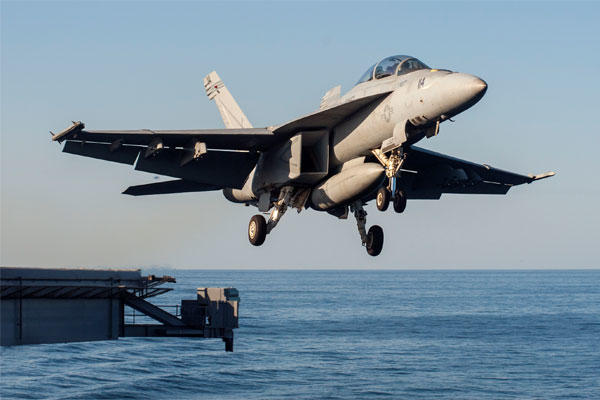U.S. airstrikes have broken up the formations of extremist militants in northern Iraq but failed to stop the overall advances of the Islamic State of Iraq and the Levant, the Pentagon's operations chief said Monday.
In reaction to the airstrikes, the ISIL fighters were "now starting to dissipate and hide among the people" to escape the U.S. warplanes, said Army Lt. Gen. William, C. Mayville. "Targeting is going to get more difficult," Mayville said at a Pentagon news conference.
"We've had a very temporary effect," said Mayville, adding that the limited air campaign could not be credited with "somehow breaking their momentum." The ISIL fighters may now think twice about advancing on the Kurdish capital of Irbil but they will "look for other things to do," Mayville said.
Navy FA-18 Super Hornet attack aircraft, Air Force F-15s and F-16s and MQ-1 Predator drones have carried out a total of 15 airstrikes since last Thursday that "slowed ISIL's operations tempo" but were "unlikely to affect ISIL's overall capabilities," Mayville said.
There were "no plans to expand the current air campaign" which was restricted to protecting Irbil, where the U.S. has a consulate, and providing relief for thousands of members of the Yazidi sect trapped by ISIL on Mount Sinjar in northern Iraq, Mayville said. "The current operations are limited in scope," he said."
U.S. warplanes have hit ISIL positions around Mount Sinjar, but "the most important thing now is airdrops" of relief supplies to the trapped Yazidis, Mayville said.
Relief agencies and the United Nations have pleaded for U.S. help in setting up a humanitarian safe corridor to get the Yazidis off the mountain.
"We're going to need a better understanding of what's going on" before options other than airdrops can be presented to President Obama, Mayville said.
The general called the ISIL fighters "very well organized, very well equipped and thus far they have shown an ability to attack on multiple axes."
Kurdish forces reported have retaken several towns from ISIL but one of the problems faced by the peshmerga Kurdish fighters was the longer-range weapons employed by ISIL, Mayville said. The U.S. was looking at the possibility of supplying the Kurds with long-range weapons to match those of ISIL, Mayville said.
In announcing the airstrikes and airdrops last Thursday, Obama said his main goals were to stop a terror campaign approaching genocide against the Yazidis while protecting U.S. personnel in Irbil and Baghdad.
Obama also said that more assistance to the central government was dependent upon Iraq forming a unity government that likely would replace Prime Minister Nouri al-Maliki, but Maliki was provoking a tense standoff to keep his seat.
Maliki reportedly surrounded himself with Iraqi Special Forces units in Baghdad's heavily-fortified Green Zone after new Iraqi President Fouad Massoum nominated Haider al-Abadi to replace Maliki as Prime Minister. Maliki said he would file a legal complaint against Massoum's action.
Vice President Joe Biden telephoned Massoum and Abadi to show U.S. support. Readouts of the phone calls provided by the White House never mentioned Maliki, with whom the U.S. has had a testy relationship.
Abadi "expressed his intent to move expeditiously to form a broad-based, inclusive government capable of countering the threat" of ISIL, the readout said.
-- Richard Sisk can be reached at richard.sisk@monster.com





























